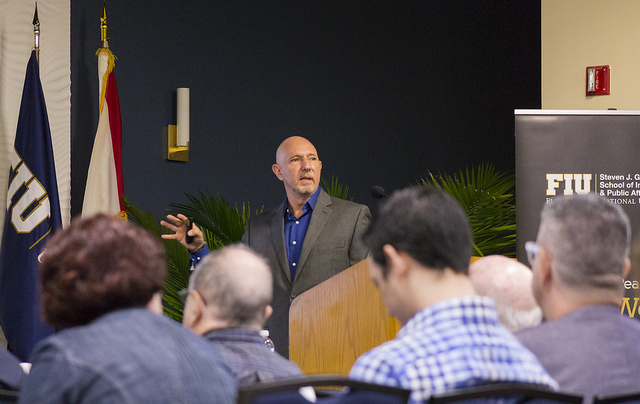
FIU Cuba poll: Miami Cubans no longer in favor of the embargo
The 2016 FIU Cuba poll was released Wednesday (Sept. 14). Its introduction states that “in the two and a half years since President Obama made his historic pronouncement on Dec. 17, 2014, much has changed and much has stayed the same in the ongoing drama between the United States and Cuba.”
The authors explained that “when we initiated the FIU Cuba Poll in 1991, our intention was to take a snapshot of the Cuban-American community in Miami-Dade County at a time of significant geopolitical changes in the world. […]”
There have been numerous polls since then, and as the authors state, “This FIU Cuba poll is the first measure of the attitudes of Cuban Americans in Miami Dade County after D17.”
What follows is a summary of the study, whose fundamental finding is that a majority of Cuban Americans no longer favor the U.S. embargo on Cuba. To see complete results of the FIU Cuba poll, click here.
- A majority of Cuban American residents in Miami-Dade County oppose continuing the U.S. embargo on Cuba. Sixty-three percent of poll respondents oppose continuing the embargo. Opposition rises to 72% among Cuban Americans ages 18 to 59. Similarly, 79% of those arriving after 1995 oppose continuing the embargo. Among registered voters, 58% oppose the continuation of the embargo.
- A majority of respondents favor increasing economic relations with the island. The expansion of business ties receives support from 57% of the sample and 90% of new arrivals support the expansion or maintenance at current levels of economic activity between the two countries.
- A large majority (69%) supported the decision to open diplomatic relations with Cuba. Younger respondents strongly back the policy shift at an 87% rate. Support for diplomatic relations drops to 43% in the age group after 76. But those arriving since 1995 favor the policy shift by 91%. Registered voters express strong support at 61%. The figure balloons to 87% among non registered voters.
- A large majority (74%) favor the lifting of travel restrictions that impede all Americans from traveling to Cuba. The only group to oppose it (at 49%) are those over the age of 76. Recent arrivals to the U.S. favor this by a whopping 93%, and 69% of registered voters are in favor of unrestricted travel.
- The Cuban Adjustment Act receives strong support. Sixty-one (61) percent strongly or mostly support the policy that has been applied to Cuban arrivals on U.S. soil since 1966. Post 1995 arrivals favor the policy by 84%, while only 40% of the pre-1980 arrivals do. Fifty-three percent of registered voters support the policy. (Interestingly, support for the CAA has declined since the 2014 poll which measured an 80% support.)
- Sixty-Five percent of respondents support changes in the Cuban Adjustment Act. In other words, requiring that entrants provide proof of political repression before becoming eligible for government assistance.
- A large majority favor the “wet foot/dry foot” immigration policy. Those arriving after 1980, and younger respondents, support the policy considerably more than those arriving before 1980. Sixty-one percent of registered voters favor the policy.
- Asked if the embargo was successful, 55 percent said it wasn’t “at all.” Only 17 percent said it worked well or very well, with 19 percent saying it had worked “not very well.”
As reported by the Miami Herald, “This being a presidential election year, the pollsters also tried to gauge the popularity of Hillary Clinton and Donald Trump among local Cubans. They favored Trump by 36-31 percent, though that number is somewhat stale because the survey was conducted from July 11-Aug. 12.
“Still, that result — slightly inside the poll’s error margin of plus or minus 3.1 percentage points — indicates trouble for Trump among Cuban Americans, the most Republican-leaning of all Hispanic voters.
“‘Cubans have never given so little support to the Republican candidate,” Grenier said. His finding echoes a survey conducted earlier this year by Republican pollster Dario Moreno, who feared Trump’s candidacy would drive Miami-Dade Cubans out of the GOP.”
[Photo at top of Professor Guillermo J. Grenier, one of the lead investigators of the FIU Cuba Poll. From the FIU website.]


